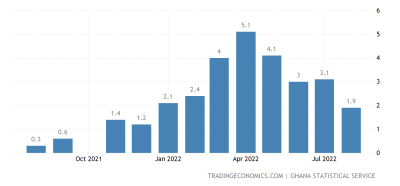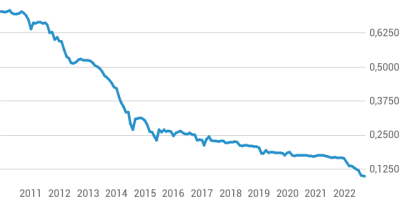
A Look At the People's Struggle In Ghana: How Capitalism Exploits
“We can’t afford rent and we’re sleeping outside. The youths are jobless” -Yaw Barimah, Ghanaian taxidriver
In late June 2022, street protests erupted in Ghana’s capital city, Accra. The above quote matches the general feel and demands of the masses who took to the streets. Most lay persons are aware of the current effects of inflation on the daily lives of the average people. Many of us have not made the necessary connection that such inflation and other tricks capitalists use to increase the amount of surplus value extracted from the populace, are inherently apart of the internal dynamics of capitalism itself. Our failure to understand this brings our protests, and dissent to a screeching halt once the point of economic reformism is reached.
In countries dominated under imperialist neo-colonialism, such as Ghana, the weight of economic exploitation is maximized. As conditions sharpen, the exploited classes of Ghana are beginning to stir. On July 4th four teacher’s unions went on strike in opposition to the neo-colonial government’s refusal to pay ‘cost-of-living allowances’ of at least 20% of their wages.
The government holds the position that due to ‘Annual inflation’ now reaching 27.6% and the accompanied reduction in value of the Cedi(1), they’re unable to pay this allowance. The system of imperialism works in a way that parasitic countries like amerika hold economic hegemony over Third World countries like Ghana. This allows for the U.$. currency, the dollar, to dictate the value of the national currencies of Third World countries. What this means for the Ghanaian and other Third World workers is that because their wages are paid in money, the national currency, the amount of their pay, although the same on paper, is devalued along with national currency.

So the exploitation of the Ghanaian worker has intensified. Their labor is still required to be done at the same rate, same hours labored, same amount of labor, and same wage paid. What has changed is the value of their labor power; with inflation, the amount of cedi it takes to maintain the worker’s needs is greater. Yet wages have not increased, or not increased as much.
To allow the common people to overstand our common interest in overthrowing capitalist dictatorship it is necessary to understand and breakdown plainly, the inner-working of capitalism and how it effects the lives of the people.
In Ghana, as described above, and many other places around the world right now, the mechanism being used by capitalist exploiters is the depression of wages. This generally occurs when the wages of the worker are below the value of their labor power. Labor power here means human work, the sum total of a person’s physical and mental effort.(2) Labor power is the primary factor in society’s production. Uniquely however, only in capitalist society is labor power a commodity.
The process of commodification of labor power manifests itself in two conditions: (1) The worker is ‘free’ in that they can ‘choose’ to sell their labor as a commodity. (2) The worker owns nothing aside from their labor power (what the mind/body can produce). They have no means of productions, or means of living and must sell their labor power to live.
Therefore, what we know as ‘employment’ in the capitalist economy consists of capitalists buying the labor power of the laborer and converting them into hired slaves.
The exploitation of workers is examined by the advent of surplus value. The degree of exploitation is examined by the rate of surplus value. The capitalist devises ways to maximize this rate of surplus value, which brings me back to depression and deduction of wages.
To comprehend wages, we must first overstand that wages are a ‘disguise’. They are a way to fool the people into thinking they’re getting equal value for their labor.
Marx said, “wages are not what they appear to be. They are not the value or price of labor, but a disguised form of the value or price of labor power.”(3) Therefore the capitalists notion that they pay the worker the price of their labor is completely fabricated.
A key in understanding political economy is to comprehend the distinction between labor and labor power. Under capitalism what the worker is selling isn’t labor, but is labor power, which is capable of being commodified, while the former (labor) isn’t.
The next logical question is why? why is labor not a commodity? Commodities exist in their final state prior to being sold, labor doesn’t. Also commodities are exchanged for equal value, according to the law of value. Therefore if labor was a commodity the capitalist should pay the full value created by labor, which would eliminate surplus value (the source of profit), which would eliminate capitalism.
If labor was a commodity, it would have value and that value would be determined by the amount of embodied labor. This can’t happen. How can the value of a phenomenon be determined by the value of itself?
What labor is is the process of labor power. Therefore the wage paid to the laborer is equal to the value of the labor power. In other words, it is the amount required to keep the proletariat as a class alive and working – that is the value of labor power. Whatever extra the worker’s labor power produces above the value of labor power (the wage paid to keep the proletariat alive) is called surplus value and it is what is ‘exploited’ by the capitalist. The wage itself is the chain that binds the exploiter to the exploited. The revolutionary demand must be to abolish the wage system.
The term ‘cost of living allowance’, caused me to think of our need to overstand where the idea of ‘cost of living’ or ‘standard of living’ has its roots.
We begin by concluding that these are two distinctive wages. In the political economy of capitalism, there are nominal wages and there are real wages. Nominal wages are expressed by the wage payment of money.
In our quest to find the ‘cost of living’, we can’t use nominal wages as representation. The cost of living will only be reflected by the amount of means of livelihood which can be bought by the money wage (nominal wage). What the nominal wage can purchase is the cost/standard of living and is called real wages.

What is taking place in Ghana is that there is a contradiction between the nominal and real wages. The nominal wage is being held in place, while the real wage is in a downward trend, a decline.
“When the purchasing power of money declines and the prices of the means of livelihood go up, the same amount of the nominal wage can only be exchanged for a smaller amount of means of livelihood. Then the real wage falls. Sometimes even if the nominal wage goes up a bit, but less than the increase in prices of the means of livelihood, the real wage will still decline.”(4)
This is essentially what we observe playing out in real time in Ghana and elsewhere. As the above quote alludes to, simple economic reforms like increase in wage will not end this phenomenon, the elimination of surplus value is the only solution. The bourgeoisie will always use the tools of inflation, price increases and rent increases to increase the contradiction between the nominal wage (money paid) and the real wage (what can be bought) to increase the rate of surplus value accumulation (the exploitation of the people).
In conclusion, I want to point out that while the protests organized by Arise Ghana and the work strike by the four teacher’s unions are significant struggles for the daily hurdles of life for the Ghanaian people, the people must be made to distinguish between the causes and effects of economic hardship. When a sick person has a cold and a running nose, they don’t merely get a tissue for the nose without curing the cold itself. The people exploited by imperialism must synthesize the economic and political struggles.
Closing with a word from Marx,
“The working class should not forget: in this daily struggle they are only opposing the effect, but not the cause that produces this effect; they are only delaying the downward trend, not changing the direction of the trend; they are only suppressing the symptom, not curing the disease.”(5)
DOWN WITH CAPITALIST-IMPERIALISM!!!
Notes:
(1) The Cedi is the national currency of
Ghana.
(2) Fundamentals of Political Economy, edited by George C.
Wang,;Chapt.4,pg.59
(3)K.Marx,Critique of the Gotha Program,selected
work of Marx &Engels Vol.3
(4)Fundamentals of Political
Economy,chapt.4,pg72
(5)K.Marx, Wages,Prices and Profit, Selected
Works of Marx &Engels, Vol.2








